Afghanistan: What's life like since the Taliban took over?
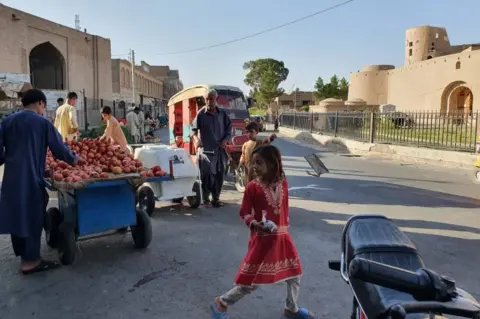 BBC
BBCWhat is life like for those left behind when the last foreign troops flew out of Afghanistan? Four people from cities and provinces around the country told the BBC they had lost basic freedoms and were struggling to survive.
Some names have been changed to protect contributors' safety.
Mazar-i-Sharif
Mazar-i-Sharif is a large city and major economic hub in the north of Afghanistan, close to Tajikistan and Uzbekistan. Once a government stronghold, it fell to the Taliban on 14 August.
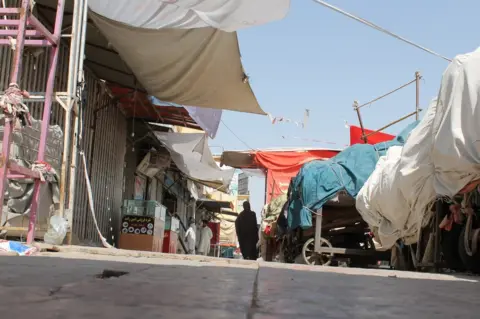 EPA
EPAMajib used to work in a restaurant. Now he's struggling to find food. In a video call from Mazar-i-Sharif, he pointed to the dirty floor of an abandoned building where a few blankets were piled - for now it is his new home.
Majib arrived in the city just a few weeks ago, one of more than half a million Afghans displaced this year by the conflict between the Taliban and recently-ousted government forces.
His father was killed by the Taliban more than 10 years ago, he said. A decade on and he's "scared to go outside" because "they're beating people up every day".
Footage from Mazar-i-Sharif last week showed dozens of Afghans carrying suitcases and clutching plastic bags as they boarded buses to the capital, Kabul, in the hope of trying to leave.
But in the past few days, since US forces departed, more people have been arriving from in Mazar-i-Sharif from Kabul, Majib said - trying to make their way to the border with Uzbekistan as a way out.
Majib is also desperate to escape, but doesn't know if he will make it. "The Taliban are here and they don't want people to leave the country," he said.
Lashkar Gah, Helmand Province
Helmand Province in the south, where British troops were stationed during the conflict, was seized by the Taliban on 13 August. The provincial capital Lashkar Gah saw some of the heaviest fighting in the weeks preceding.
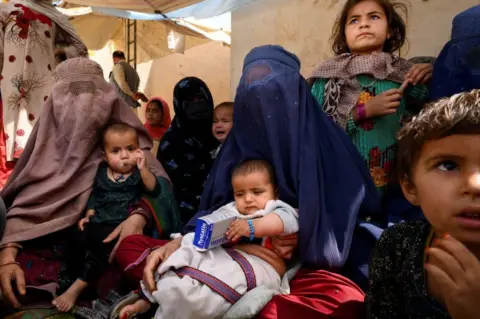 Getty Images
Getty ImagesPinned to the noticeboard of Dr Viktor Urosevic's office are small plastic bags containing bullets. "We call it our wall of shame," he said, as he removed one to hold up to the camera in a video interview.
Most of them were large calibre rounds which he had removed from young patients, he said.
Dr Urosevic works at a trauma hospital in Lashkar Gah. Now that the fighting has ended, the wards are no longer packed like they were just weeks ago. The bombs and bullets have stopped and the streets outside are calm.
"It's very strange, I've been here for a few years, but it's never been so quiet," he said. "I'm seeing it as the silence before the storm, I hope I'm wrong, but let's see."
Many buildings were damaged or destroyed in bombings in Lashkar Gah and families who fled during the conflict have come back to find their homes in ruins, Dr Urosevic said.
"They're sleeping in front of the mosque, they're sleeping in the streets," he said. "They don't have the funding to rebuild their homes so a lot of them have ended up being homeless or forced to stay with their relatives."
He said a lot of families in the area were living in poverty, struggling to get a meal during the day. With banks closed for many days, a lack of access to cash has exacerbated the problem.
Many foreign aid workers who would be distributing this kind of aid left the country as the Taliban took charge. Dr Urosevic, from Serbia, is among those who decided to stay behind.
"We have a responsibility, we are the only trauma centre in the province," he said. "People need food, they need money, they need medicines."
Badakhshan
One of Afghanistan's poorest provinces, Badakhshan, in the northeast of the country, borders Tajikistan. The Taliban took control of its provincial capital on 11 August.
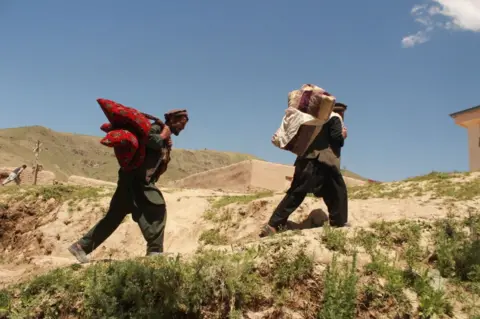 Getty Images
Getty ImagesAbdul is a doctor in Badakhshan. He was a student the last time the Taliban ran the country.
"The situation at that time was very bad and their behaviour is the same as they were in the past," he said. "I don't see any changes."
Abdul sent the BBC several pictures from a hospital in the area which is now guarded by the Taliban. In one, an 18-month-old boy lies emaciated on a bed, as his mother begs for staff to save him. According to Abdul, she could not afford to feed him.
"Day by day, more children are becoming malnourished," he said.
According to the UN, more than half of the children under five in Afghanistan are expected to be acutely malnourished in the next year.
Poverty was already a reality for many in this province, but food and fuel prices have risen since the Taliban took charge and government employees have lost their jobs. Some are still waiting to be paid for the last few months.
Abdul also fears for women's rights in the province. While female medical staff have been allowed to work, he said many other women weren't being allowed to continue with their jobs and were left wondering what lies ahead.
Girls above Class 6 - above UK secondary school age - were no longer being allowed to go to school, Abdul said. "People don't have any hope for their future," he said. "There is no opportunity for people in Badakhshan."
Herat
Herat, a Silk Road city close to the border with Iran, was seen as one of Afghanistan's most liberal. The day after US troops left, hundreds of Taliban supporters filled the streets. Others stayed home in fear.
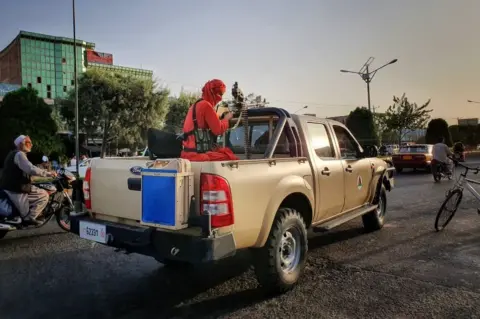
Gul had just come back from the market when he spoke to the BBC. "All over the bazaar, the Taliban are standing with their guns," he said. "You don't see many rich people or women and girls on the street now because they're all afraid of the Taliban."
Gul's wife Afsoon now can't leave the house without taking a male escort and she has to wear a burqua covering her face. "The future for my daughter is unclear," she said.
And Gul's sister, a doctor, was told to stay away from her clinic for a few weeks, he said, even after Taliban leaders told women in the medical profession they could return to work.
Days later she was able to return alongside other women, Gul said. But many other women were still at home, he said, unsure if they can resume the careers they had worked for. Gul and his family are still hoping to leave Afghanistan.
"We will go anywhere," he said. "America, Germany, France. Anywhere."
